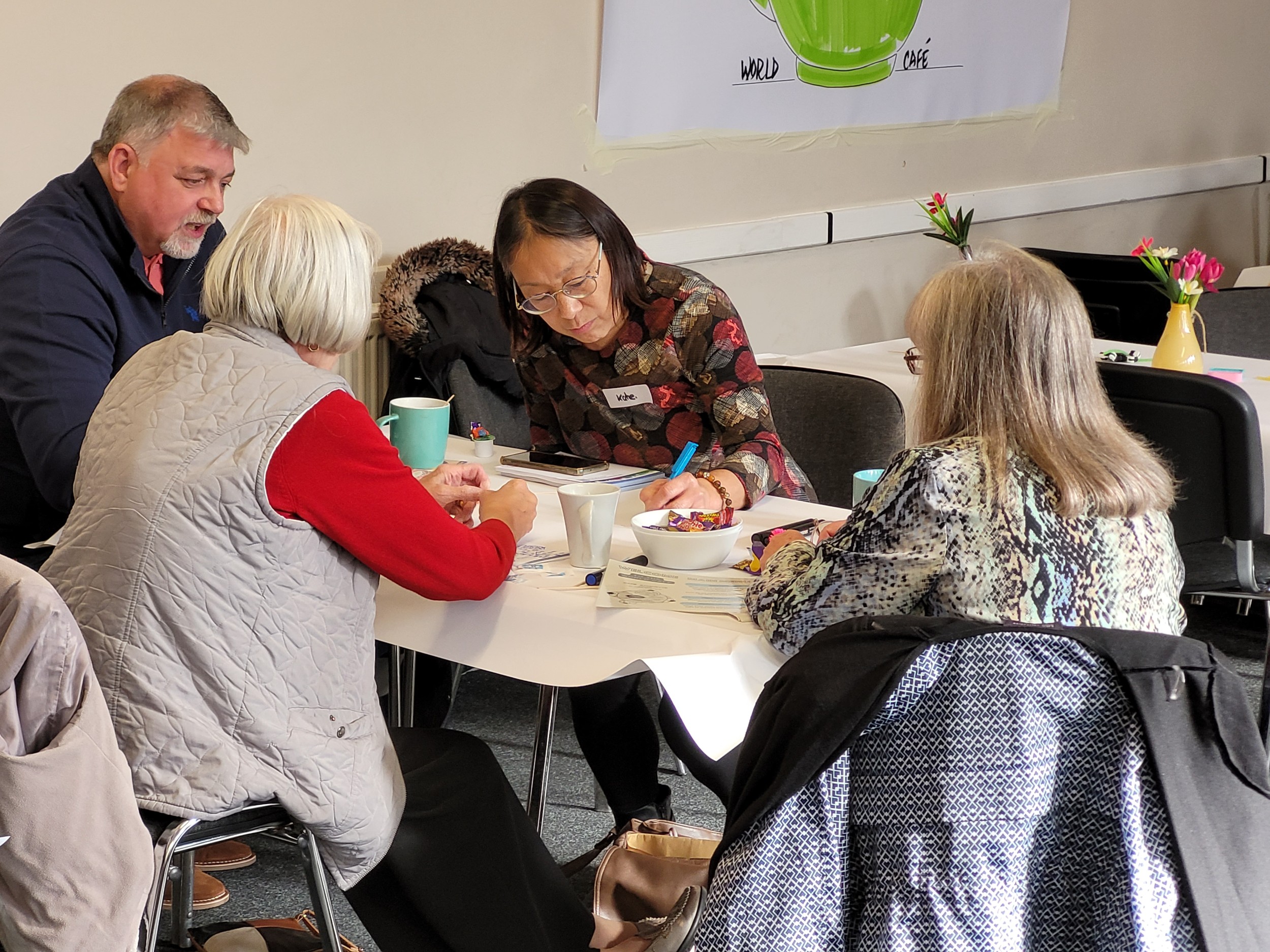
The NIHR West Midlands Regional Research Delivery Network enables the health and care system to attract, optimise and deliver research across the region. It is one of 12 Regional Research Delivery Networks in England, working together as one organisation with joint leadership.
Hosted by The Royal Wolverhampton NHS Trust and funded by the Department of Health and Social Care, the RDN's vision is for the UK to be a global leader in the delivery of high quality research that is inclusive, accessible, and improves health and care. Please contact them at wm.
These case studies give an idea of the Primary Care activity in the Network:
From patients and public, to healthcare assistants, to nurses, doctors, pharmacists and allied healthcare professionals, we all have a role to play in research. After all, new drugs, new processes, new evidence would not exist without our role in research.
My name is Faiza Yahya and I work as a Primary Care Clinical Pharmacist for Dudley Integrated Health and Care Trust (DIHC) and Our Health Partnership (OHP). I started my primary care role working for DIHC over six years ago when it was Dudley CCG. It was always my ambition to work in primary care, although I have also worked in the hospital and community pharmacy sectors. My vision one day is to see all these sectors collaborate for better, seamless patient care.
On reflection, I would say I started seeing the initial impacts and rewards of research from our everyday practice through audits, service evaluations and quality improvements. I could see the fruits of these projects and how they improve patient care and patient safety. I was inspired by senior leaders who had a vision for quality improvement and better population health. I learnt to understand why we had methodical and rigorous structures to drive quality improvement projects forward.
The difference we could make was phenomenal. It awakened my passion to be involved in this and to be able to one day make a difference of my own. I did a lot of reflection on what skills I needed to improve and how I could get involved in this realm, particularly in primary care. I then sought out and started a Health Education England Clinical Academic Research Internship to develop my skills in research.
In terms of clinical trials and research involvement, we often think of commercial trials, industry or those trials based in the hospital sector. We seldom think of primary care research and in the past, we hadn’t really been exposed to it a great deal during our pharmacy undergraduate degrees. The dynamics of healthcare have changed over time and if we want to align with NHS long term plans and the integrated care systems models, we need to start thinking about patient care and research in the community.
I wanted to know more about this so I reached out to the NIHR Clinical Research Network West Midlands and asked the question, ‘how can I get involved? I want to be part of this’. I also reached out to experienced senior pharmacists in my teams who had an interest in driving research forward.
When the DaRE2THINK study was introduced to me, especially with the innovative design of using CPRD for pre-screening, I was very excited to be a part of it! Studies such as this have shown that clinical research is evolving, and non-medics and allied health professionals can and must be a key part of driving research projects forward. Although I am very keen on developing my personal skills, I really want to be able to make a significant contribution to healthcare and motivate others to also develop. Research often requires a collaborative team approach and to use the skills of different healthcare professionals can certainly strengthen research and create the environment where we can all learn from each other.
The DaRE2THINK trial was ideal for me as a pharmacist as the research was on the use of direct oral anticoagulants and I have been able to upskill and extend my scope of practice in the process. I would encourage all pharmacists and allied health care professionals to seek opportunities in research in clinical practice as we know that practices/populations who are engaged in research have better health outcomes.
Parents across the West Midlands are being urged to support a new respiratory virus study looking into the UK’s leading cause of babies being admitted to hospital.
RSV (Respiratory Syncytial Virus) is one of the leading causes of hospitalisation in all infants worldwide, and affects 90% of children before the age of two.
RSV often causes only mild illnesses, like a cold. However, for some babies, it leads to more severe lung problems such as bronchiolitis and pneumonia. In recent months, there has been a resurgence of RSV following the easing of COVID-19 public health measures.
The groundbreaking HARMONIE study is looking at how strongly babies can be protected from serious illness due to RSV infection, by giving them a single dose of nirsevimab, a monoclonal antibody immunisation.
The HARMONIE study is open to newborn babies, and babies who are up to 12 months old. It will last approximately 12 months and includes a single in person visit, with entirely virtual follow up visits.
Anyone interested in finding out more or signing up can visit the study website: rsvharmoniestudy.com.
Professor Matthew Brookes, Clinical Director of the NIHR Clinical Research Network West Midlands said: “RSV is a major cause of death and illness in children across the world and it is the most common reason for admission to hospital in children aged under one year in the UK. Nearly 80% of the children admitted to hospital with RSV are previously healthy and at certain times of the year, children’s wards are full of babies with this infection.
“We would encourage parents to support this important study, with the knowledge that they will be making an invaluable contribution to the health of babies now and in the future.”
The study, which is a collaboration between Sanofi, its partner AstraZeneca, and the National Institute for Health and Care Research (NIHR), will evaluate the efficacy of nirsevimab. The antibody has recently been approved by both the Medicines and Healthcare products Regulatory Agency (MHRA) and the European Medicines Agency (EMA).
Dr Simon Drysdale, Consultant Paediatrician in Infectious Diseases at St. George's University Hospital NHS Foundation Trust and Co-Chief Investigator of the study, said:
“RSV is a common respiratory virus which affects nearly all children before the age of two. For most children it causes a mild illness like a cold, however it can lead to more severe lung problems for some, such as bronchiolitis and pneumonia.
“The HARMONIE study is looking at how strongly babies can be protected from illness caused by RSV infection through a single antibody dose, which acts in the same way as antibodies in our own bodies but is targeted specifically to fight RSV.
“Previous Phase 3 studies have been completed to date and show that nirsevimab is safe and effective in preventing RSV in preterm and healthy infants. The HARMONIE study is looking to further assess the impact with more babies involved.
“The study is critical to helping the NHS, the Joint Committee on Vaccination and Immunisation (JCVI) and the Department of Health and Social Care (DHSC) find out whether it is feasible and beneficial, to patients and the NHS, to routinely implement nirsevimab in healthy babies.”
Professor Andrew Ustianowski, National Specialty Lead for Infection at NIHR Clinical Research Network, said:
“This study, supported by the National Institute for Health and Care Research across more than 100 sites, provides the UK with the opportunity to lead the way in a disease which impacts infants globally.
“By carrying out this widespread study, we can help discover how babies can be protected from such a common, yet potentially debilitating virus. Previous smaller studies of the antibody injection being used has shown nirsevimab has a good safety profile in babies, which will hopefully provide parents with confidence to take part in the study.”
Dr Bogdana Coudsy, Global Head of Medical for Vaccines at Sanofi, said:
“Given RSV is a leading cause of hospitalisation in all infants, we are excited to start this research that puts the needs of participants, carers, and investigators at the heart of its development. This is an innovative study in design and execution, a model for the future, thanks to a hybrid digital design and close collaborative work.”
Nirsevimab is an long-acting antibody aiming to protect all infants from birth entering their first RSV season with a single dose.
Participants of the HARMONIE study will be randomly assigned into one of two groups. One group will receive the antibody dose, and in the other group no injection will be given.
More than 20,000 infants across three countries (United Kingdom, France and Germany) will take part in the study, from August 2022 to March 2023.
Hello my name is Ella Thompson. I have been a Practice Manager in Dudley for the last 14 years and for the last four years I have also been working with the NIHR CRN West Midlands as their Practice Manager Research Champion (PMRC).
When I joined my current practice (The Ridgeway Surgery) in 2013 I was keen to engage them in research, alongside a newly recruited salaried GP. Between us we take sole ownership for research within the practice and both of us enjoy having a separate role from our usual primary care activity. As study involvement is well supported by the CRN team, it adds little to our workload and it is a positive experience to be involved with various important research studies. Many of our patients enjoy engaging with research projects; often it can lead to very positive feelings of self-worth for those involved who feel they are giving something back. It’s also viewed positively by the CQC.
So when the CRN advertised for a PMRC I applied, hoping I could maybe give something back and encourage Practice Management colleagues to also become research active. The CRN was keen to increase the engagement of GP practices with NIHR CRN Portfolio of research. The role required me to work alongside their team of GP Research Champions and with members of the CRN team to raise awareness of opportunities to participate in primary care research (especially research delivery in day-to-day practice).
The post was intended to facilitate strengthening of links between Practice Managers, GPs and the CRN primary care specialty delivery team, as well as with university-based primary care research teams. The requirement was to predominantly raise awareness of the Clinical Research Network’s High Level Objectives (HLOs) and support the Primary Care delivery team to achieve these.
I have found the role very rewarding and have successfully increased the amount of practices engaging in research in Dudley, I have also increased Clinical Practice Research Datalink (CPRD) involvement with the majority of Dudley practices now signed up to participate. I attend various meetings in order to help advise the CRN about the practicalities of rolling a study out within general practice.
I was won the Rising Star category at the CRN WM Awards two years ago, for which I am very grateful. The CRN team is a lovely group of people, very supportive and friendly and I have very much enjoyed being a small part of their world and helping in any way I can.
If you are interested in becoming involved with research but would like a one to one conversation about it first, to get a real feel for what is involved and if it is for you and your practice, please feel free to ring me on 01902 886501 or email ella.
A GP practice in Warwick is among those offering antiviral treatments to patients in the world’s largest community-based Covid-19 research study.
Research Co-Ordinator Georgina Stannard (pictured, right with GP Dr Ruth Penfold), of Budbrooke Medical Practice talks about their involvement in the Platform Adaptive trial of NOvel antiviRals for eArly treatMent of COVID-19 In the Community PANORAMIC Trial which is investigating several potential COVID-19 treatments to help people possibly recover more quickly at home.
Since January 2022, they have signed up 119 of their patients to the study, across five GP Practices in the group, of which Budbrooke is the Hub.
“We thought the study offered a really good opportunity to offer these treatments to our patients and many were very keen,” says Georgina. “We mostly contacted relevant patients after carrying out searches to identify Covid-19 cases, but quite a few asked us about taking part.
‘We had been research active previously including the PRINCIPLE trial, which was similar, and the DARE2THiNK study which involves patients with atrial fibrillation. The team at the Clinical Research Network West Midlands has been really supportive throughout - their nurses are really prompt at answering queries and efficient in helping with the searches and carrying out safety checks.
“We have over 25,000 patients registered to our practices, so that gives us access to a large pool of potential participants, although obviously it’s only those with confirmed Covid-19 who can be approached.
“Everyone has been pretty positive about it when asked to take part. And even those who were randomised to the arm of the trial not receiving the antivirals were happy to help.
“It’s been really worthwhile for us to contribute to this trial - we are doing something proactive to help combat the virus, and our patients are being offered access to treatments they wouldn’t otherwise get.
‘Our confidence in what our partnership can achieve in Primary Care research has really been boosted and we are now in set up for a new arm of the trial involving the drug Paxlovid.”Practice Manager Sarah Davies added: “ We have also been highly proactive in other Covid studies, for example virology sampling, so we could offer patients PCR testing prior to this being offered nationally, and looking for other influenzas, as well as providing Oxford University samples to test for a range of Covid related studies.
“We really embrace and value being part of our research group and being supported by the CRN West Midlands.”
About the Trial
A lot of research has focussed on finding treatments for those already sick enough to be admitted to hospital.
PANORAMIC aims to find out if new antiviral treatments help those with COVID-19 in the community prevents the need for being admitted to hospital and helps people recover quicker.
Those consenting to be part of the study will be randomly selected to either be in a group who receives a course of an antiviral treatment, or a group that doesn’t.
Two different groups are needed so the study team can see any difference in the health of those who received the antiviral treatment compared to those who didn’t.
This information will help the NHS to develop plans for how to best make new antiviral treatments available to patients who would benefit most from this treatment.

A very high number of practices in the Black Country are signed up to Clinical Practice Research Datalink (CPRD) which means the population is represented in the observational research they do. Find out more about its application in the Dare2THiNK study.
The NIHR Research for Patient Benefit grant to the University of Birmingham will be hosted by the Black Country ICB. Read about it here.


